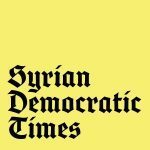Latest US-Syria policy impacting North and East Syria
By Lacy MacAuley
US and Saudi officials met in territory controlled by the Syrian Democratic Forces (SDF) with local officials from Autonomous Administration of North and East of Syria (AANES) and local Arab tribal leaders. Joel Rayburn, US State Department Special Envoy for Syria, and William Robak, foreign affairs advisor to the Global Coalition to Defeat ISIS, and Thamer Sabhan, Minister of the State of Saudi Arabia who is very close to Mohammad Bin Salman were pictured in a meeting in Deir Ez-Zor with Arab tribal leaders and local AANES council members.
An interesting exchange occurred at a recent Middle East Institute event in Washington DC on Syria. Ms. Senam Mohamad, co-chief of the US Mission of the Syrian Democratic Council, asked a question directed toward Ambassador James Jeffrey, who is the top US diplomat on Syria.
She asked about the Turkish occupation of Afrin and why there is no Syrian Democratic Council (SDC) representation in the negotiations mandated by the United Nations Security Council Resolution 2254 (UNSCR 2254). The traditionally Syrian-Kurdish city of Afrin is currently being occupied by Turkey and has seen unspeakable human rights violations. SDC has yet to receive a voice in the UNSCR 2254 negotiations, despite its pivotal role in defeating ISIS and bringing governance and stability to North and East Syria.
Of course, these are tough questions to answer. But Jeffrey did not even address these questions at all. After seeming not to remember the question at first, he made a joke and then punted both matters to another speaker, Edmund Fitton-Brown, terrorism and sanctions analyst for the UN, who of course didn’t have the background to address either of the two questions.
Washington-based Syria experts such as Nicholas Heras responded on Twitter. Heras tweeted, “Answer Should Have Been: When you are responsible for stabilizing 25-33% of #Syria, you are key to sustainably countering #ISIS, and you are being asked to provide care for hundreds of thousands of IDPs (including FFs from the West), yes you (the #SDF) do get a seat at the table.”
Speaking at a House Foreign Affairs Committee hearing on May 22, 2019, Ambassador James Jeffrey said, “We don’t have a political future that we offer for [the SDC]. The political future that we offer for them is the political future that we offer for everybody in Syria, which is under 2254.” At the same time, Jeffrey did not say anything about the exclusion of the SDC from the peace negotiations taking place under UNSCR 2254.
US Congressional officials, however, showed support for SDC at the hearing. Rep. David Cicilline asked about the occupation of Afrin. Rep. Bill Keating asked how we could “protect the YPG and the Kurds.” Many in Congress asked about trying Assad for war crimes in the International Criminal Court (ICC) or another court. A few asked about how the United States is helping process ISIS detainees. None spoke of an international tribunal for ISIS war criminals.
Many times during the hearing, Jeffrey said that they want other countries to pay for the ISIS detainees as well as reconstruction and development, not the US. He said, “Can’t someone else step up and do this? We’re only 17% of the world’s economy.”
However, the interim report from the Congressionally-appointed Syria Study Group recommended assisting with local development through the START Fund and the Relief and Recovery Act. The 12-member group issued their interim report on May 1, 2019, and will be issuing a final report near the end of 2019. These Syria Study Group recommendations will likely be converted into a proposed bill in US Congress within the next year.
The Autonomous Administration of North and East Syria (AANES) has not only committed its military forces the SDF to combating ISIS, it has effectively stabilized its region, roughly one-third of Syria. Yet it continues to get the short shrift by its allies in the US, when it should be supported and empowered politically, economically, and culturally.

